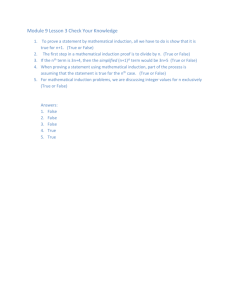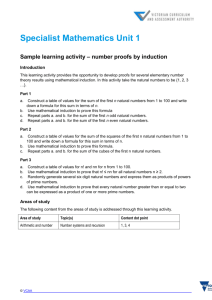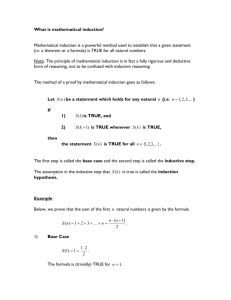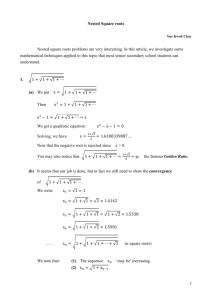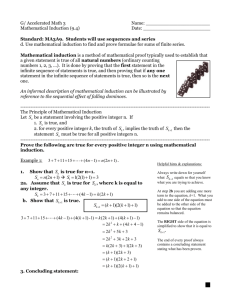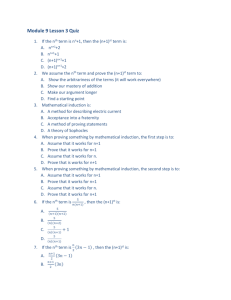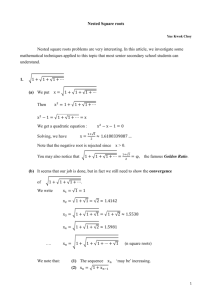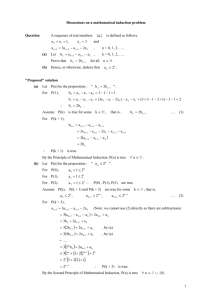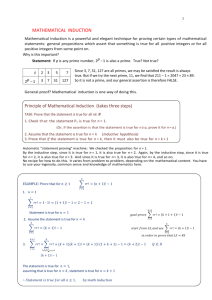See Statesman, 266e. 1) 0 is a natural number. 2) Whenever n is a
advertisement
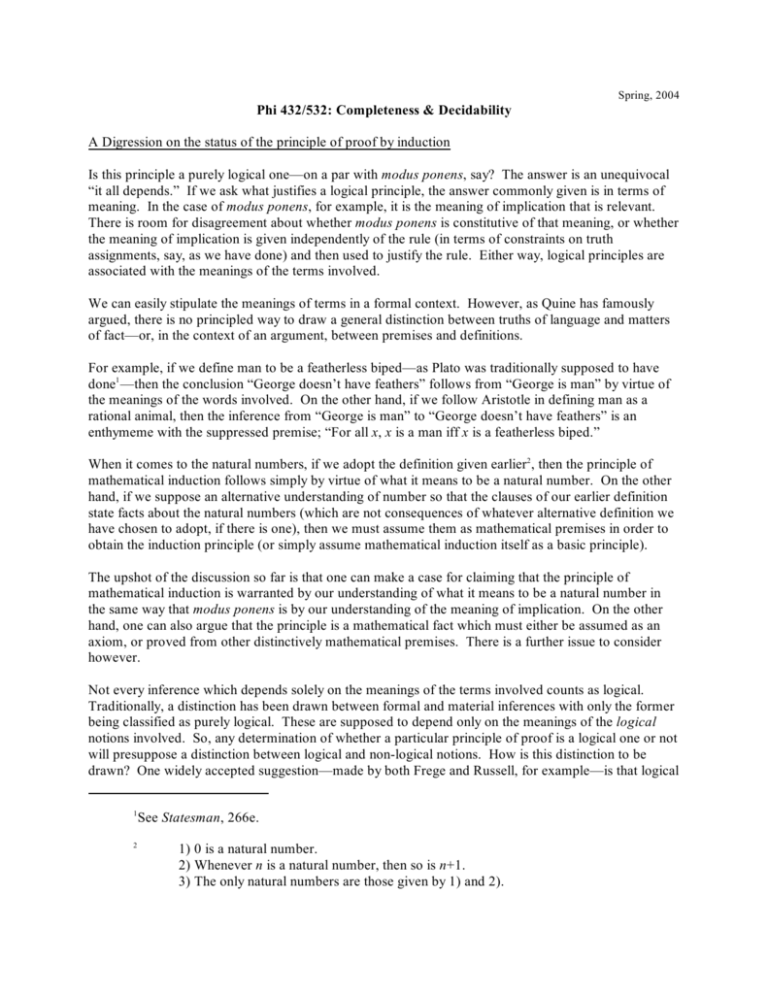
Spring, 2004 Phi 432/532: Completeness & Decidability A Digression on the status of the principle of proof by induction Is this principle a purely logical one—on a par with modus ponens, say? The answer is an unequivocal “it all depends.” If we ask what justifies a logical principle, the answer commonly given is in terms of meaning. In the case of modus ponens, for example, it is the meaning of implication that is relevant. There is room for disagreement about whether modus ponens is constitutive of that meaning, or whether the meaning of implication is given independently of the rule (in terms of constraints on truth assignments, say, as we have done) and then used to justify the rule. Either way, logical principles are associated with the meanings of the terms involved. We can easily stipulate the meanings of terms in a formal context. However, as Quine has famously argued, there is no principled way to draw a general distinction between truths of language and matters of fact—or, in the context of an argument, between premises and definitions. For example, if we define man to be a featherless biped—as Plato was traditionally supposed to have done1 —then the conclusion “George doesn’t have feathers” follows from “George is man” by virtue of the meanings of the words involved. On the other hand, if we follow Aristotle in defining man as a rational animal, then the inference from “George is man” to “George doesn’t have feathers” is an enthymeme with the suppressed premise; “For all x, x is a man iff x is a featherless biped.” When it comes to the natural numbers, if we adopt the definition given earlier2 , then the principle of mathematical induction follows simply by virtue of what it means to be a natural number. On the other hand, if we suppose an alternative understanding of number so that the clauses of our earlier definition state facts about the natural numbers (which are not consequences of whatever alternative definition we have chosen to adopt, if there is one), then we must assume them as mathematical premises in order to obtain the induction principle (or simply assume mathematical induction itself as a basic principle). The upshot of the discussion so far is that one can make a case for claiming that the principle of mathematical induction is warranted by our understanding of what it means to be a natural number in the same way that modus ponens is by our understanding of the meaning of implication. On the other hand, one can also argue that the principle is a mathematical fact which must either be assumed as an axiom, or proved from other distinctively mathematical premises. There is a further issue to consider however. Not every inference which depends solely on the meanings of the terms involved counts as logical. Traditionally, a distinction has been drawn between formal and material inferences with only the former being classified as purely logical. These are supposed to depend only on the meanings of the logical notions involved. So, any determination of whether a particular principle of proof is a logical one or not will presuppose a distinction between logical and non-logical notions. How is this distinction to be drawn? One widely accepted suggestion—made by both Frege and Russell, for example—is that logical 1 2 See Statesman, 266e. 1) 0 is a natural number. 2) Whenever n is a natural number, then so is n+1. 3) The only natural numbers are those given by 1) and 2). concepts are distinguished by their generality: they apply universally and are not restricted to any particular domain of inquiry. Although this criterion makes some decisions clear-cut—“all” and “some” are logical, for example, whereas “is a baseball player” is not—it does not enable us to draw a sharp distinction between logical and non-logical. Again, in a formal context, it is easy enough to specify the logical terms of a language3 . However, while there have been various ingenious attempts to provide a precise criterion of demarcation, it seems fair to say that the issue remains unresolved.4 In practice, there is little dispute about which terms are to count as logical, but that is more because we have inherited from Aristotle a conception of the sorts of inference we want to classify as logical than because our choice is determined by principled reasons. Returning now to mathematical induction, there are two foundational approaches one may take to the natural numbers. One is to define them as we did earlier in set-theoretic terms within the context of theory of sets whose axioms are taken to determine, albeit only partially, what it means to be a set. Then the principle of mathematical induction follows as a matter of logic from these axioms. In this case, the principle would be a purely logical one only if we were to count the notion of set as logical. The other is to treat the notion of number as primitive (i.e. undefined) and to lay down as axioms certain principles which hold of numbers, including mathematical induction. If we were to take these axioms as determining (in part, at least) what it means to be a natural number, the principle would be a purely logical one only if we were prepared to count the notion of number as a logical one. The preponderance of opinion is against counting set theory as a part of logic (although it would certainly seem to qualify by the criterion of generality discussed above). The same is probably true about number. However, the situation here is more controversial. That is because Frege showed that, if we are prepared to count so-called second order quantifiers5 as logical notions, we can define the set of natural numbers in purely logical terms and prove the principle of mathematical induction from this definition. It’s a matter of some controversy whether second order logic is ‘really’ logic, but we shan’t pursue this matter any further. For the sake of definiteness, the preceding discussion has focused on the set of natural numbers and the principle of mathematical induction. However, analogous considerations apply to any inductively defined set and its associated principle of proof by induction. Furthermore, we can in fact dispense with these other principles and simply use mathematical induction instead in all these cases (as I indicated in my notes on the subject), so their logical status might be said to depend on the status of mathematical induction. Finally, we are in a position to answer the question with which we began: is induction a logical principle on a par with modus ponens? It all depends.... 3 See, for example, Zalabardo’s distinction between logical and extralogical vocabulary at the beginning of chapter 3. 4 A solution to the problem was proposed by Alfred Tarski in the mid-sixties—see his excellent paper: “What Are Logical Notions?”, History and Philosophy of Logic, 7, pp.143-54—but it still remains a subject of debate in the contemporary philosophical literature. 5 That is quantifiers which range over properties of, and relations between, individuals—in contrast to the familiar first order quantifiers, which range only over individuals. 2
